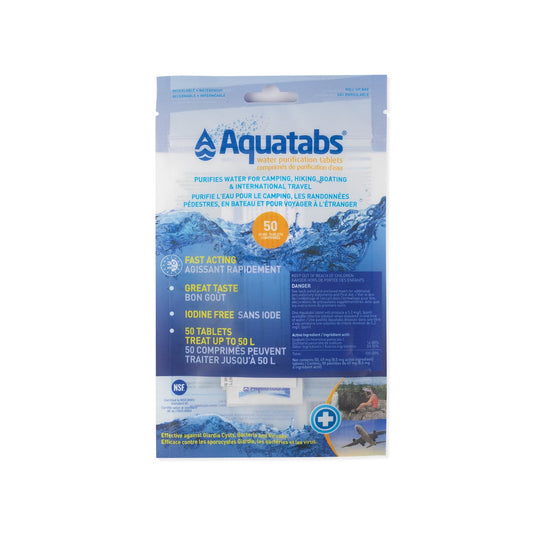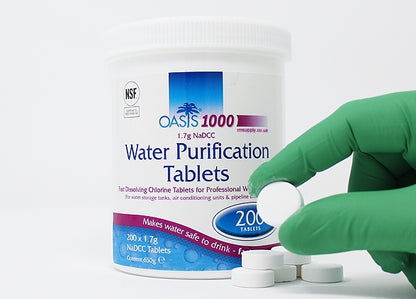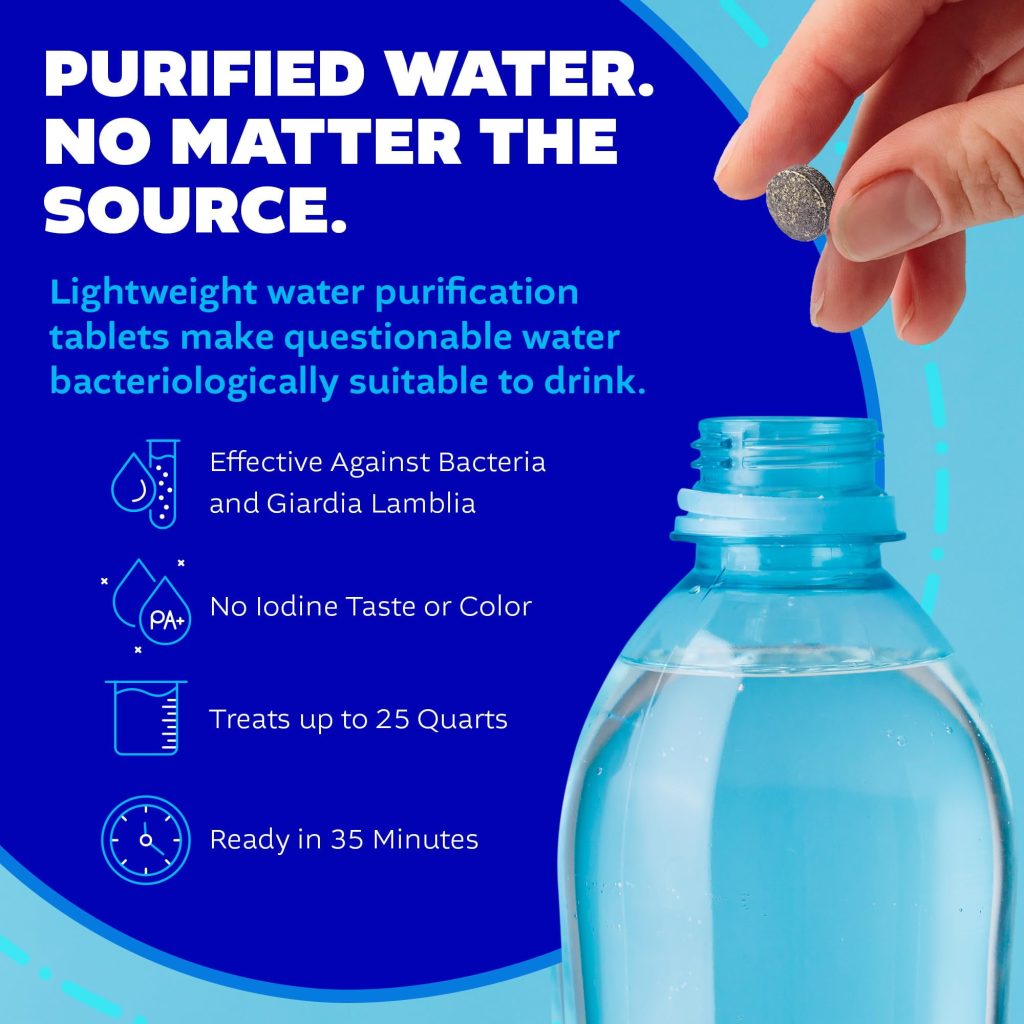Have you ever stopped to wonder what those little purification tablets really do to your water? If you rely on them for clean drinking water, knowing how they work can give you peace of mind.
These tablets might look simple, but they play a powerful role in protecting your health. Keep reading, and you’ll discover how these tiny tablets transform unsafe water into something safe and drinkable—giving you confidence every time you take a sip.
How Purification Tablets Work
Purification tablets clean water by killing harmful germs. They make water safe to drink.
The tablets release chemicals that destroy bacteria, viruses, and parasites in the water.
Chemical Agents Used
Purification tablets use chemicals that kill germs quickly. These chemicals are safe in small amounts.
The most common chemicals are chlorine and iodine. Both work well to clean water.
- Chlorine destroys many types of bacteria and viruses
- Iodine is effective against bacteria and some parasites
- Some tablets use chlorine dioxide for stronger protection
Process Of Killing Pathogens
The chemicals in the tablets break down the walls of germs. This stops germs from working.
The germs then die or become too weak to cause sickness. This makes water safe to drink.
- Tablet dissolves and releases chemicals into the water
- Chemicals attack germs’ cell walls and proteins
- Germs lose function and die
- Water becomes free from harmful pathogens
Types Of Purification Tablets
Purification tablets help clean water by killing germs and bacteria. They make water safe to drink during travel or emergencies.
These tablets come in different types. Each type uses a different chemical to purify water.
Chlorine-based Tablets
Chlorine tablets are common for water purification. They kill most bacteria and viruses in water quickly.
They are easy to use and usually work within 30 minutes. Chlorine tablets can leave a slight taste in the water.
Iodine-based Tablets
Iodine tablets disinfect water by killing germs. They are effective against bacteria, viruses, and some parasites.
These tablets work fast but may change the water’s taste and color. They are not recommended for long-term use.
Other Chemical Variants
Other tablets use chemicals like chlorine dioxide or silver ions. These can kill a wide range of germs safely.
Some variants take longer to work but have fewer taste effects. They are good for sensitive users and longer trips.
- Chlorine dioxide tablets kill bacteria and viruses quickly
- Silver ion tablets prevent bacteria growth over time
- Some tablets combine chemicals for stronger purification
Effectiveness Against Contaminants
Purification tablets are used to make water safer to drink. They help reduce harmful substances in water. These tablets work by killing or removing contaminants.
Different tablets target different types of contaminants. Knowing how they work helps you choose the right one.
Bacteria And Viruses
Purification tablets kill many types of bacteria and viruses. They break down the cells or stop viruses from multiplying. This lowers the chance of waterborne diseases.
These tablets are very good at handling common bacteria like E. coli. They also reduce viruses such as hepatitis A and norovirus.
Protozoa And Parasites
Protozoa and parasites are larger than bacteria. Some purification tablets can kill or disable them. Others may not be fully effective against all types.
Protozoa like Giardia and Cryptosporidium are often harder to remove. Some tablets need more time to work against these parasites.
- Tablets may require longer contact time for parasites
- Not all tablets remove all protozoa effectively
- Sometimes additional filtration is needed
Chemical Pollutants
Chemical pollutants include pesticides, metals, and industrial waste. Most purification tablets do not remove chemicals well. They mainly target living organisms.
To reduce chemical pollutants, other methods like activated carbon filters work better. Tablets alone are not enough for chemical contamination.
Usage Guidelines
Purification tablets help make water safe to drink. They kill harmful germs and bacteria.
Using these tablets correctly is important. Follow the instructions to avoid illness.
Dosage And Timing
Use the right number of tablets for the water volume. Too few tablets may not clean the water well.
After adding tablets, wait the correct time before drinking. This lets the tablets work fully.
- Usually, one tablet treats one liter of water.
- Wait 30 minutes after adding tablets before drinking.
- In colder water, wait up to 60 minutes for best results.
Water Conditions Impacting Efficiency
Clear water allows tablets to work faster. Dirty or cloudy water needs extra care.
High water temperature helps tablets work better. Cold water slows down the process.
- Remove dirt and particles by filtering water first.
- Use more tablets if water is very cloudy or dirty.
- Allow longer waiting time in cold or murky water.
Advantages And Limitations
Purification tablets help make water safe to drink by killing germs. They are used in many situations like camping or emergencies.
These tablets have both good points and drawbacks. It is important to know both sides before using them.
Portability And Convenience
Purification tablets are small and light. You can carry many tablets in a small space. This makes them easy to take anywhere.
You only need to add a tablet to water and wait. This is simple and fast compared to boiling water or using big filters.
Taste And Odor Changes
Some tablets may change the taste or smell of water. This can make the water less pleasant to drink.
Chlorine-based tablets often leave a slight chemical taste. Letting water sit after treatment can reduce the odor.
- Chlorine tablets may cause a strong taste
- Some tablets use iodine, which also changes taste
- Treated water might smell like chemicals
- Waiting after treatment can improve taste
Health Considerations
Purification tablets kill harmful germs but may not remove all chemicals or metals. They work best for biological contaminants.
People with allergies or thyroid problems should be careful with iodine tablets. Always follow the instructions to avoid health risks.
- Tablets kill bacteria, viruses, and protozoa
- They may not remove heavy metals or chemicals
- Iodine tablets are not for long-term use
- Follow dosage instructions carefully

Credit: 72hours.ca
Alternatives To Purification Tablets
Purification tablets are common for cleaning water but are not the only choice. People use other ways to make water safe. These alternatives can fit different needs and situations.
Each method works in its own way to remove or kill germs and particles in water. Choosing the right one depends on what you have and what you want.
Filtration Systems
Filtration systems remove dirt, bacteria, and other particles from water. They use a physical barrier to clean the water.
Filters can be simple or advanced. Some use charcoal to improve taste and remove chemicals.
- Portable filters are good for camping and hiking
- Home filters connect to taps for daily use
- Some filters remove tiny germs and protozoa
Boiling Water
Boiling water kills bacteria, viruses, and parasites. It is a simple and effective method to purify water.
Bring water to a rolling boil for at least one minute. At higher altitudes, boil for three minutes to be safe.
- Boiling does not remove dirt or chemicals
- Use clean containers to store boiled water
- Let water cool before drinking
Uv Purification
UV purification uses ultraviolet light to kill germs in water. It stops microbes from growing and spreading.
UV devices need power, like batteries or electricity. They work fast and do not change the water’s taste.
- UV light does not remove particles or chemicals
- Water must be clear for UV to work well
- Regular cleaning of the device is needed
Common Myths And Facts
Purification tablets clean water by killing harmful germs. People use them when clean water is not available.
Many myths exist about these tablets. It is important to know the facts to use them safely and correctly.
Safety Concerns
Some worry that purification tablets are unsafe. The truth is they are tested and approved for drinking water.
These tablets can cause mild side effects if used as directed. Overuse or allergy may cause problems.
- Follow the instructions on the package carefully
- Do not use tablets past their expiration date
- Store tablets in a dry, cool place
- Stop use and seek help if you feel sick
Misuse And Overuse
Using too many tablets can make water taste bad and cause health issues. Use only the recommended amount.
Some people think tablets remove all chemicals. They mainly kill germs but do not remove all pollutants.
- Use the correct number of tablets for the water volume
- Do not use tablets as a long-term water solution
- Boil or filter water if chemical pollution is a concern

Credit: rmsupply.co.uk

Credit: coalcrackerbushcraft.com
Frequently Asked Questions
What Do Purification Tablets In Water Do?
Purification tablets kill bacteria, viruses, and parasites in water. They make unsafe water safe to drink quickly and effectively.
How Long Do Purification Tablets Take To Work?
Most tablets work within 30 minutes to 4 hours. Time depends on water quality and tablet type used.
Are Purification Tablets Safe For Daily Use?
Yes, they are safe for short-term use. Long-term use should be limited due to chemical exposure.
Can Purification Tablets Remove Chemical Contaminants?
No, tablets mainly kill microorganisms. They do not remove chemical pollutants or heavy metals from water.
Conclusion
Purification tablets help make water safe to drink. They kill harmful germs and bacteria quickly. Using these tablets is easy and practical, especially when traveling or camping. Always follow the instructions for best results. Clean water protects your health and prevents sickness.
Keep purification tablets handy for emergencies or outdoor trips. They offer a simple way to ensure safe drinking water anywhere. Trusting purified water means peace of mind every time you drink. Water safety matters, and purification tablets can help you stay healthy.

